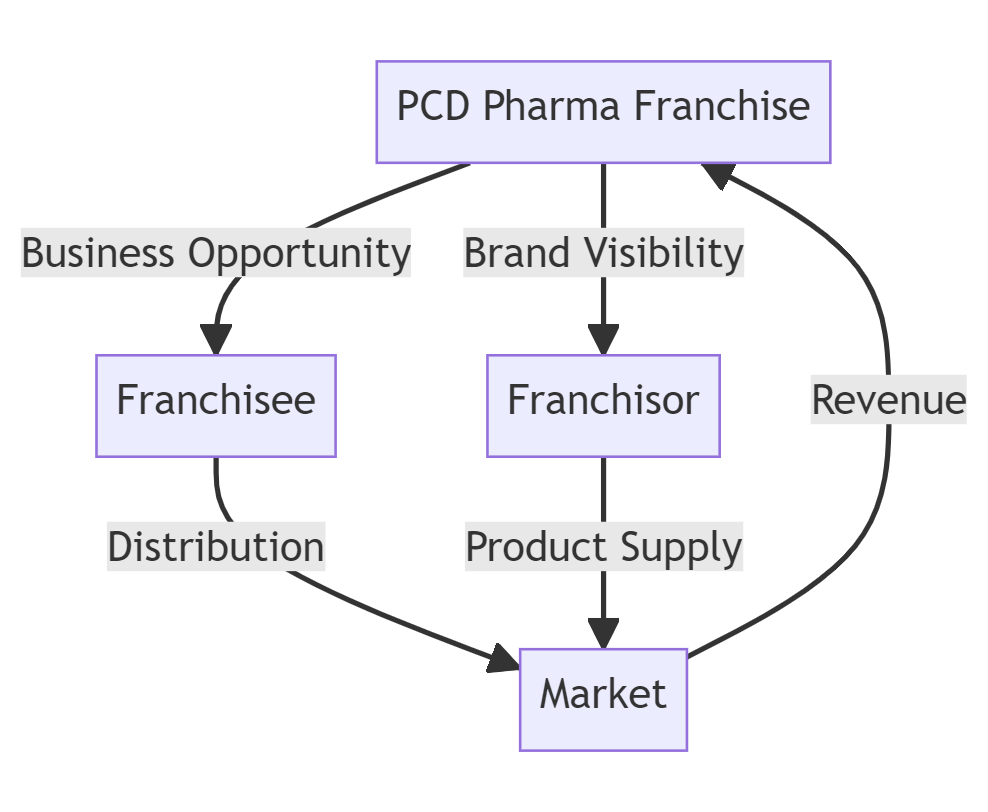What is PCD? Meaning, Benefits & How to Start in Pharma
Before we understand the term “What is PCD in Pharma,” we first need to know what is meaning of PCD and What is the full form of PCD in pharma is.
PCD Full Form – Propaganda Cum Distribution
PCD Meaning – The meaning of PCD is very simple; it is a business model where a company gives permission to a person or distributor to promote and sell its medicines in any specific area.

To put it simply, it means there is a company that manufactures medicines, but instead of selling medicines everywhere, it works with partners (franchisees or distributors) who do the promotion and selling of medicines on their own.
And this model helps the company reach more people without spending too much on marketing or setting up stores. It is a win-win situation for both the company and the partners (franchisees or distributors), where the company sells medicines without spending much, and the partners also earn some profit.
The pharmaceutical industry in India is growing very fast. More people need good medicines, and more companies are trying to meet that demand. That’s why smart business models like the PCD Pharma Franchise have become popular. They help both the company and the distributor to grow without spending too much money.
For more in-depth information in a simple and easy way, I recommend you watch the complete video below.
Here’s a visual representation of the PCD Pharma Franchise business model:

How PCD Ownership Differs from Owning Your Own Pharma Company:
Starting a business in the pharma industry? You’ve got two options – build your own pharmaceutical company or go for PCD ownership. Let’s make it super simple and compare both:
a) Investment Required
- Pharma company ownership: For this, you need a big budget. From opening a factory to lab, branding, and hiring – there is a lot to do.
- PCD ownership: This will be very cheap for you. You can start with Rs. 10,000. Perfect for beginners or small businesses.
b) Brand & Trust
- Pharma company ownership: Here, you will own everything. Name, brand, everything will be yours, but it may take some time to build trust.
- PCD ownership: Here, you will not own the brand, but you can use the name of a reputed company, which can quickly build trust with doctors and chemists.
c) Expiry Worries
- Own Pharma Company: If your medicines are not sold on time, i.e., before expiry date, then you may incur a loss.
- PCD Ownership: Here you can buy medicines in small batches as per demand, hence the risk of non-sale is less here.
d) Legal & Government Rules
- Own Pharma Company: You must handle all legal and regulatory matters yourself.
- PCD Ownership: The main company handles all that, and you have fewer headaches here.
e) Marketing & Promotion
- Own Pharma Company: You need to do all the marketing, branding, and advertising yourself.
- PCD Ownership: The company already has a name – they give you tools and support to promote the products.
How PCD Pharma Franchise Works
So, how does a PCD Pharma Franchise actually work? Let’s break it down simply.
Firstly, the company that manufactures medicines provides franchise rights to any person or distributor to sell their products. This means you get the right to promote and sell their medicines in your city, town, or district, and you do not have to compete with any other franchisee in the same area. And this is called monopoly rights.
You don’t have to worry about manufacturing the medicines at all. The company will provide you with everything, including the products, marketing materials like visual aids or product cards, and let you use the brand name to build deep trust with doctors and chemists.
To start this business, you have to choose a good pharma company, and then sign an agreement with the company, and you have to place your first order. After that, you start promoting in your area and take orders from local clinics, hospitals, and medical stores.
It’s a simple model – the company makes the products, and you focus on selling them
Benefits of Starting a PCD Pharma Business
If you are thinking of starting a PCD pharma business then you are taking the right step. Here you can enter the world of pharma without spending much money. Let us understand its benefits in simple words:
Low Investment & Minimal Risk
- You do not need lakhs of rupees to start this business. Here you can start with a small amount like ₹10,000-₹50,000. In the beginning, you order only the products that you need in the beginning, so the risk here is less.
No Sales Targets
- Like all other jobs, here you are not given any monthly target, here you are free. Here you can sell at your own pace. There is no pressure on you and neither there is any need to run after any number.
High Growth Potential
- You must be aware that the healthcare and pharma industry is always growing. And along with it, the demand for medicines is also increasing, so here your business can also grow rapidly if you choose the right company and product.
Be Your Own Boss
- And the best thing about this business is that you are the one who makes your own decisions about how to work, where to sell and how much to earn. This is true freedom.
if you want a business that’s easy to start, gives you flexibility, and has huge future scope — PCD Pharma is the perfect option for you.
How to Start PCD and Documents required for it:
Embarking on a PCD venture involves several key steps and necessary documents. Here’s a guide to help you kickstart your PCD business:
- Business Plan: Develop a comprehensive business plan outlining your objectives, target market, and financial projections. This plan will serve as a roadmap for your PCD business.
- Legal Structure: Choose a suitable legal structure for your business, whether it’s a sole proprietorship, partnership, or private limited company. Register your business accordingly.
- GST Registration: Obtain Goods and Services Tax (GST) registration, a mandatory requirement for pharmaceutical businesses. Ensure compliance with tax regulations.
- Drug License: Acquire a drug license from the local drug control office. This license is essential for dealing in pharmaceutical products and ensures adherence to safety standards.
- Trademark Registration: Consider registering a trademark for your brand. This provides legal protection for your brand name and logo, preventing unauthorized use by others.
- PCD Agreement: Draft a clear and comprehensive PCD agreement outlining the terms and conditions of the partnership. This should include details about product distribution, marketing, and responsibilities.
- Quality Certifications: Ensure that the PCD company holds quality certifications such as WHO-GMP and ISO. This guarantees that the products meet international quality standards.
- List of Products: Provide a detailed list of pharmaceutical products you intend to promote and distribute under the PCD model.
- Office Space and Infrastructure: Set up a suitable office space with the necessary infrastructure, including storage facilities for pharmaceutical products.
- Promotional Material: Design promotional material such as product catalogs, visual aids, and marketing literature to effectively promote the pharmaceutical products.
- Distribution Network: Establish a robust distribution network, including hiring skilled professionals for effective product promotion and distribution.
By meticulously following these steps and ensuring proper documentation, you can lay a solid foundation for your PCD business in the pharmaceutical industry.
Scope of PCD Pharma in India
And now let us talk about the scope of PCD Pharma, and why it is considered one of the best pharma business opportunities today.
The population of India is increasing rapidly. And at the same time, people are becoming more aware of their health and are visiting doctors regularly. Due to this, the demand for quality medicines is also increasing, and this is where PCD Pharma comes into play.
This business model is growing rapidly, especially in tier 2 and tier 3 cities. These areas normally lack large pharmacies or medical suppliers, so there is a good opportunity for a small PCD distributor, as low competition and high demand make this a golden opportunity.
And nowadays people’s income is also improving, and they have started preferring good health services. And at the same time, the government is also focusing on cheap medicines, so its future looks very bright.
So if you are thinking of entering the pharma world, this is a very good time. The PCD pharma space in India is strong and growing – offering long-term growth and stability for new business owners.
EL.V. Life Sciences – The Best Company to Partner for PCD Business
Do you want to enter the pharma world with low investment, zero sales pressure, and maximum growth? If yes, then E.L.V. Life Sciences is your ideal partner. We have been helping individuals and businesses to start their own PCD pharma franchise across India.
We Offer:
- Monopoly Rights: Get exclusive rights for your area
- No Sales Targets: Work at your own pace
- Low Investment: Start with a budget-friendly plan
- High-Quality Products: Trusted by professionals across India
- Strong Support System: Marketing materials, product training & more
- Franchise Opportunities PAN India: Available in states like UP, Bihar, Rajasthan, Maharashtra, Karnataka & more – Available in states like UP, Bihar, Rajasthan, Maharashtra, Karnataka & more
Why Partner with Us?
With 15+ years of PCD expertise and 30+ years of manufacturing experience, our roots are strong, and our support is even stronger. We manufacture in Baddi, Himachal Pradesh, and have our headquarters in Chandigarh – India and serve customers in 10+ global markets.
For more details, you can contact them at
- Phone: 8890309463
- Email: contact@indiapharmafranchise.com
- Head Office: SCF 330, First Floor Moter Market, Manimajra, Chandigarh. Pin -311001

If you found this article helpful for you, we’ve got plenty more to explore. Check out our blog page you can also watch this below video




